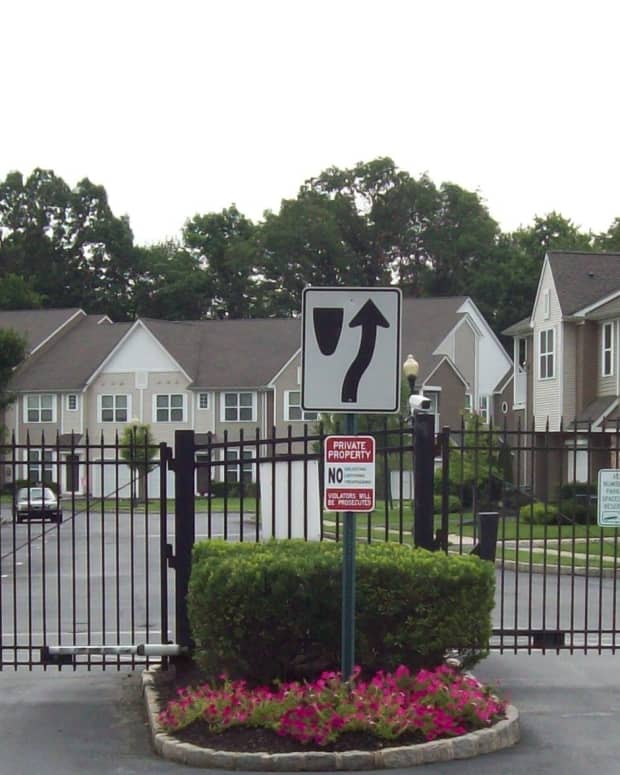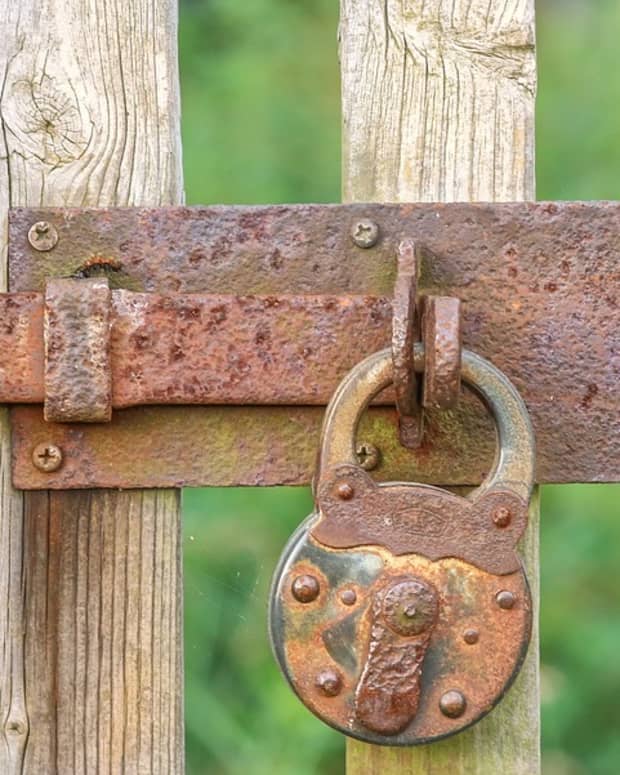何As Vs Homeowners: Selective Enforcement
As President of my HOA Board, I can relate to a full spectrum from HOA management to homeownership within a wide range of issues & topics.
What is Selective Enforcement?
它会发生,可能比你意识到的。薄ard members (or a particular board member) will enforce the rules and regulations for some – but not all. Every now and then it’s a personal vendetta against a homeowner or their renter, and it can interrupt the peaceful living they have every right to enjoy.
Our last President was rampant with selective enforcement. He instructed the management company to have all calls referred to him; whether it be keys to the pool, maintenance requests, RV rental spaces, Clubhouse rentals, etc. His friends received privileges, and if he didn’t like you, he abused his power to send out violation notices. He once threatened me with a fake violation notice – that’s when I decided to run for the Board and unseat him.
What about the other board members, you may ask? Two resigned in protest as they didn’t want to serve with him (those seats remained vacant). The other two were his “quorum” buddies and allowed him to do as he pleased.
I once sat on a jury trial of an HOA lawsuit about selective enforcement. The board President (representing the HOA) was suing a homeowner for repeated violations. The homeowner lived across the street from the President. They personally didn’t like each other, and the homeowner suffered consequences from the abuse of power. The President set up a security camera aimed at the neighbor’s home. A blatant invasion of privacy while recording personal activity. The homeowner won his case, but what a shame it required going to court for peace and quiet.
First Step of Protection: Know Your Governing Documents
Most issues that arise in an HOA have a defined resolution by referring to the governing documents. If you know them, you may also avoid any situations that may cause distress.
I find that most homeowners and many board members don’t even know what’s in their governing documents.
The documents I’m referring to include the Declaration of Covenants, Conditions, and Restrictions (CC&Rs), the Bylaws and Rules & Regulations.
These recorded documents are what govern the HOA and form its operational structure of which all parties must comply – and therein, lies the power of information and knowledge.
Covenants, Conditions, and Restrictions (CC&Rs)
Think of the CC&Rs as the “Constitution” usually designed by the Developers of the community. It contains the description of the property; the difference between the “common areas” (owned by all homeowners) and the living units (owned privately by the homeowners).
It will also cover possible future functions of the HOA, which may include developing more units, mergers, easements, some of which are elements already established through the HOA’s development and existence for any period of time.
The CC&Rs will also cover subjects such as elections, assessments, and duties of the association. Here is where you can gain the power of information. In addition, it will likely define architectural guidelines on approval for renovations or improvements to individual units.
The knowledge of being familiar with the CC&Rs will help avoid future dispute issues.
Bylaws
The Bylaws basically pertain to the Officers and Board Members; terms, duties, meetings, elections, etc. It usually outlines the power(s) of the Board, and the process for enforcing violations. Many require a “Courtesy Notice” of an alleged violation before assessing any fines. This allows the homeowner time to rectify whatever the non-compliance may be.
Keep in mind, that not enforcing the rules makes the Association seem ineffective, and that can give an arbitrary appearance of selective enforcement. That doesn’t mean a Board isn’t flexible. They are at liberty to make exceptions if warranted; reserving these exceptions to “exceptional” circumstances. Although, states differ, not enforcing a rule may invalidate it.
Remember, the Bylaws should contain the procedure for compliance issues; allowing homeowners to comply, respond, and the right to a hearing, if requested. Many infractions are basically unintentional due to a lack of knowledge within the governing documents.
Rules & Regulations
The creation and adoption of the Rules & Regulations are by the Board Members. Even if enacted by previous boards, new board members typically have the authority to change, amend and/or create new rules. These should be for the benefit of the community and designed to deal with specific issues that the Association may have in its individuality of operation.
These can include parking enforcement, pool hours, clubhouse rentals, satellite and cable installation, pet policies, and most usage of amenities.
Refuting Selective Enforcement
One of the most important considerations for both the HOA and community members is that enforcement is reasonable and nondiscriminatory. There needs to be consistency in enforcing the governing documents of an Association. When the HOA takes action upon perceived violations, it should not be arbitrary and in a reasonable manner according to the procedures and due process outlined in the governing documents.
All actions taken against a homeowner are documented in Executive Meeting Minutes by board vote. If it results in a violation notice, it should cite the code of the alleged infraction.
If there is a management company, include them in any correspondence or documentation. Although the motto of most management companies is “we take direction from the board;” licensed community managers do not want an appearance of improper activity continuing once a notification is received. They value their license above all.
Pick your battles. HOAs have the resources. The board members don’t incur any expenses for legal fees, nor escalated arbitration or mediation expenses. Most also have a D & O (Directors & Officers) insurance policy. Meaning, an insurance claim will pay legal expenses, and if found in fault, the insurance company pays the liability. The exception is usually if the act had a willful or malicious intent, which can be hard to prove.
作为一个房主,你有权看到任何/l documents, bank statements, violation reports, meeting minutes, etc. The only records homeowners are usually not allowed to have access to are other homeowners private information, such as assessments owed, outstanding fines, individual contact information, or lease agreements on file. All other records and documents are public to the homeowner. You pay your assessment fees; it is your money. Yes, Board Members are volunteers, but hold the fiduciary responsibility of adhering to the governing documents.
Protect Yourself from HOA Bullies
Don't become apotential victim of corruption. Attend a training class or seminar on the operations of an HOA. Find out when the next HOA expo is scheduled, and enjoy networking with other homeowners, board members, and vendors. There are also various classes available covering State laws governing HOAs (e.g. HOA elections, fining process, homeowner rights, finances, etc.) It’s a good way to meet various leaders in the industry and get free advice. The instructors are usually professionals in the HOA industry, and available after class to answer specific questions or insight into issues.
Remember, it is an "industry," and everyone has their hands in the homeowners' pockets. Be sure to pick your battles as the stakes can be high. The book何A Warriorcovers a lot of issues from challenging the Board of Directors to true nightmare stories. You'll discover you are not in this alone and there is help available.
何A Warrior
Questions & Answers
Question:Can our HOA continue to keep a padlock on the pool without any notice to the homeowners about an opening date? We live in Arizona. I have written an email but I have yet to receive a reply.
Answer:The Board usually has the right to set open and close dates of swimming pools, as well as the hours. You will probably find it in the Rules & Regulations of your governing documents. However, at this time, our pools are also locked due to the COVID-19 Health Department Guidelines. Our Tennis Courts are also closed; although, they may be the first to open in regard to our amenities.
Our Association pools are considered "public pools" by the Health Department. We have fought this as we believe it should be classified as a private pool since you need a membership to use (Homeowner/Resident being the membership). But lost that battle. So, your pool may be under the Health Department guidelines, and your Board has to comply with that. Check out your State Health Department Guidelines on public pool openings; then "fight" your battle. I'm sure many residents will be on your side. A campaign of emails, phone calls, and other petitions to your Board and/or Management Company should get a response.
With all that said, the Board should post a notice on the pools with an explanation of its closure and the anticipated date of opening.
Question:My HOA knows that I am the only owner with a vehicle that qualifies as a camper, which is not permitted to be parked on the property. All owners have admired the camper and had no issue with it until I requested that the HOA hold one of the other owners accountable for a water leak. Immediately following that request, the HOA decided to enforce the no camper rule, knowing that only I would be affected. Can this be considered selective enforcement?
Answer:You state it's only you in violation of the Rules & Regulations. So technically they are not selecting the enforcement. Sounds more vindictive. However, with that said, read your governing documents and look for loopholes (i.e. do they offer an "RV Lot" to park campers).
Question:Can the HOA contact my mother about an issue they have with my vehicle's stickers? I'm 34. My mom's name is in the house but she does not live here. The car is 100% in my name
Answer:If the vehicle stickers are in reference to the HOA (i.e. parking, identification, etc); then, yes, they can contact your mother. The homeowner is responsible for anyone (tenant or relative) living in their home.
Question:Can the HOA enforce subjective standards of home maintenance?
Answer:Subjective Standards? Anything the HOA can legally enforce must be in the governing documents. So, a board member can't just say, I don't personally like this, or I think this or that needs to be done, etc.
If your home needs EXTERIOR maintenance, request to see the home maintenance rule or regulation they are trying to enforce. Many times HOAs are responsible for the exterior. They have no business inside your home - unless it is affecting neighbors (i.e. a water heater breaks and the water flooded into a neighbor's home).
Comments
Labby1on August 02, 2020:
Hi, and thank you for your comment. While I understand what you’re saying, I think my comment may have been too lengthy, so some of the issues got lost in it. And, I should clarify some things. The very same board president who approved my project verbally did NOT approve it seven months later when I was asked to submit paperwork, conveniently right after she received a letter from me complaining about a lack of meetings. (It is a very small community and I know the other board member. The president withheld my application from the other board member and made the decision without the other member’s vote.) Also, our community is filled with homes that have dead “lawns” and nothing but dirt and weeds for yards. It’s been that way for a few years now, and never gets addressed. Yet, the board chose to target my seven month old completed project??
Don’t get me wrong - I’m glad it got handled without much issue. But, something seems really wrong here.
I want to be clear: It isn’t the fact that I needed to get the documents in order that bothers me. That was never a big issue, and I turned it in the same day it was requested. It’s the other circumstances surrounding it. That’s the issue.
Thanks.
Mickon August 02, 2020:
Can my HOA choose to retroactively and selectively enforce one issue but not others? We never had an official HOA board but once we formed one they went back over a year and are attempting to enforce issues related to fencing but not addressing any other issues in violation of ccrs - seems wrong to me.
TL Stahling (author)from US on July 28, 2020:
Labby1 inciden——谢谢你分享你的景观t with me. You would think with the President's verbal approval, there would be no incident. However, what if the current President didn't run for re-election and a new board and/or President took over? There would be nothing in your homeowner's file to protect you from the "whims" of others in the future. Thankfully, you only had to add more plants to get approval. Keep in mind that Boards change members - and management companies; so it is important that actions are documented.
TL Stahling (author)from US on July 28, 2020:
Those who rent their HOA units are usually investors. Unfortunately, many homeowners do not background check or take responsibility for their renters. If a renter violates an HOA policy, it is the homeowner who is responsible for any fines or damages. This would be directly billed to the homeowner. You mention "fees." Fees cannot be charged to just one homeowner if it involves a raise in the Association assessment.
Gailon July 25, 2020:
何A treats owners who rent their units as “ cash cows” with new and constantly growing fees. It is a selective inforcement ?
Labby1on July 10, 2020:
Hi, I would like your opinion on an incident. Thank you in advance.
我已经工作大约一年前。之前to having it done, I asked the board president about the procedure, to be sure I knew and followed the correct process. She stated there was currently no ARC, so no procedure, and said I should move forward with the work. I did. She even saw the work following completion. Seven months later (yes, seven months,) I got a call from the management company saying I didn’t get approval. Long story short, I turned in the paperwork for approval, and, lo and behold, the board president - the very same person who told me to move forward and had already seen the completed project - didn’t approve it. She said to add more plants. I had to turn in another round of paperwork showing more plants. Again, denied, unless I added two more plants. I agreed, and finally got approved. (Coincidentally, the call that I got seven months after the fact came a few days after I sent a letter to the board president expressing my dismay over the lack of meeting options during COVID, since many communities were having virtual meetings. I got a call from management about that, too, saying I hurt the board president’s feelings.)
Regarding our CC&Rs, they do not specify a minimum number or type of plants. They are very vague and leave much to the subjective. In fact, what’s in our CC&Rs regarding this matter is so short, I’ll just copy and paste it here. It states the following two paragraphs only. How does a homeowner properly plan a project based on the following? How does a board properly approve a project based on the following?
“No building, fence, wall, obstruction, screen, awning, or structure of any kind shall be commenced, erected or maintained upon the Project, nor shall any alteration or improvement of any kind be made thereto until the same has been approved in writing by the Committee. Plan and specifications showing the nature, kind, shape, color, size, materials and location of such improvements, alterations, etc., shall be submitted to the Committee for approval as to quality of workmanship and design and harmony of external design with existing structures, and as to location in relation to surrounding structures, topography, and finish grade elevation.”
“No landscaping on a Lot visible from the street or from the Common Area shall be undertaken by any Owner until plans and specifications showing the nature, kind, shape and location of the materials have been submitted to and approved in writing by the Committee.”
TL Stahling (author)from US on June 19, 2020:
"Reasonable" is hard to interpret. I do not know much about constructing a home from the ground up; however before building, did you submit an ARC Form (Architectural Review Committee)? Was it approved? You mention side setbacks, and your neighbor being a front setback. Even though you submitted the surveyor's report, they may want to make sure you are following such guidelines. If there is still conflict, I would contact your Real Estate Ombudsman (I don't know what City or State you're in) and follow up with them. That shouldn't cost much. They should have a mediator who will know the State Laws regulating HOAs and will review your governing documents to render an opinion.
Anne Marie Brandton June 14, 2020:
I was continually harrassed and threatened by our HOA board regarding a term in our Rules regarding side setbacks when building my house. The rule states that "a reasonable buffer should be maintained between lots". No distance is noted therefore leaving the actual distance in feet up to the board. It would have cost me tens of thousands if dollars to fight this. I essentially had to remove 50 feet of block on one side of my home to satisfy what the board members perceived as reasonable. This happened in the beginning stages of my building. 3/4 of the way through my building a home was started 2 doors down from me. We also have a clearly stated 150' front setback from the street in our rules which I have followed. The home being built 2 doors down looks to be 75' back from the street, which was approved by the same board. I just received yet another email from them asking for a site visit to confirm that now that the house is almost finished, they would like to confirm my side setbacks they asked for. Mind you I have already spent thousands of dollars moving my house, then paid a surveyor to come and draw up an official document showing where the new house foundation lies after I removed that side wall. I gave them this document and thought this was then end of their harassment. Only now to receive yet another email from their secretary requesting to come to my property yet again to see that the setbacks are in place. Again Ive already given them the foundation survey from my surveyor showing Ive met their demands. Yet they continue to harrass me.
My question is, is this a case of selective enforcement when clearly the same board approved a home after mine was started, allowing them to break our clearly stated 150' setback rule?


















